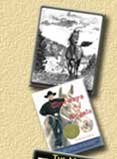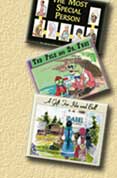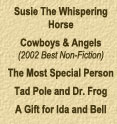
Michael's Monthly Column "Throwing My Loop"
REAL KEYS
The young man had made the decision to take his life. Lying weeping across a hotel bed in Missouri, all hope was gone. With no friends, no money, and no prospects, his situation seemed bleak indeed. Worse yet, he was completely unable to see any path out of the darkness. He wanted so desperately to do something, but there was nothing he knew to do. “Best to end it all,” he said through gritted teeth. Then, something happened.
Later he would share the story of how something came over him - an odd and strange feeling that would lead to dramatic changes in hundreds of thousands of lives. “Others must feel this same way,” he thought sitting up on the bed. The young man began to pace the small room as the idea welled up in him stronger and stronger. “Others must feel the same way,” he repeated over and over to himself. Then the realization came into crystal sharp focus. He would not take his life. Instead he would devote his life to discovering how it is that we do better. He would spend the rest of his days searching and finding answers to that question. The young man’s name was Dale Carnegie.
The first leg of his journey took him to the New York City Library. There he would spend two months reading every tome, text, and article about psychology, about our relationships with others, and how we can personally improve. At the end of that time, he said, “I knew no more than when I began.” The available material did not offer much in the way of solid practical advice. But Dale Carnegie did not despair this time. He continued on and he found answers.
While I certainly am not comparing myself to such a towering figure as Carnegie, I traveled a similar road. As a young man, I was a hopeless academic failure, riddled with self-doubts, and plagued by low-self esteem. For reasons I still struggle to understand, at the bottom of my despair, a great “curiosity” rose up in me. “How do we do better?” Can we improve and are there any real solutions? Is there really any thing that works? The powerful and wonderful answer to that question is “Yes!” There is hope and it’s a real and living thing. Like Carnegie, I found some answers too. Not because of any original discoveries or brilliance on my part, but rather by reading, observing, and listening to others on the same quest, I found truths that helped me in my life. While all who had a powerful impact on me are too numerous to mention in this short space, here are a few that moved me along the path…
The first was Maxwell Maltz. This plastic surgeon turned successful author wrote a book in the early sixties called, “Psycho-Cybernetics.” This 268 page paperback offers suggestions on “how to get more living out of life,” how to use our imagination to begin a more successful method of learning, and how to dehypnotize ourselves from false beliefs. Maltz suggested we begin by replacing negative thoughts with positive ones. When faced with any task instead of saying, “Oh, I absolutely can’t do that,” instead he suggested we use statements such as, “You know, if I tried, I just might could do that. After all, others can do it, and with practice, coaching and repeated effort, I could too.”
Higher academics and research psychologists rejected Maltz’s work as “wishful thinking without scientific merit.” While Maltz didn’t gather formal statistics, still his work offers genuine practical advice on how to live more effectively. Here is an example…
Have you ever noticed when someone pays us a compliment, the first thing we often do is reject that praise. If a person says something favorable about the way we are dressed for example we often respond, “Oh, this old thing has just about had it, I just grabbed it out of the closet this morning.” Or we say something like, “Well, all my clothes look so awful, and this is the only nice thing I have…” We just seemed compelled to explain to others who say something nice to demean or disparage any thing good about ourselves. “Well, I don’t want to appear boastful,” we say.
While I agree that we don’t want to seem arrogant, there is something very interesting that happens when one of our loved ones engage in this same behavior. Whenever our child or grandchild makes a derogatory remark about their ability in a particular area or their personal appearance, we simply will not tolerate that same behavior in someone we love. “Don’t speak that way about your self,” we bark at them. “God certainly doesn’t make any junk, and my grandchild is good and caring person. If you don’t believe in your self, no one else will,” we say. “Get your head up, and don’t you dare be ashamed of who you are!” We give all sorts of good advice to that person about faith, don’t we? Maltz suggested that we simply treat ourselves with that same loving kindness. Not to appear arrogant or boastful, but to remember a clear and simple truth. If you don’t believe in who you are, no one else will. We see that in our children and know it’s true. We need to see that same truth about ourselves.
Another writer that did a great deal for me was a man named Timothy Gallway who wrote a book called, “The Inner Game of Tennis.” Now as a roper and a cowboy, I don’t look too good in shorts, and could hardly be described as a tennis buff, but Gallway’s teachings have value for us all.
The author described a familiar mental process we all use every day without realizing it. He used the game of tennis for explanation, but whether we are selling computers, playing shortstop or roping steers, we all do what Gallway described. And that is that when we hit a shot, if the outcome is not what we intended, we berate our self.
He referred to this “voice inside our head” behavior as Self One and Self Two. Self Two he explained does all the work. Self Two hits the shot, ropes the steer, or meets the sales prospect. When we fail to live up to our internal expectations about what was supposed to happen, Self One raises all kinds of hell. “Why did you do that, you stupid idiot!” shouts our internal drill sergeant. “Of all the dumb things you could have said, why did you pick the worst possible thing to say? Well, now you’ve done it…you’ve made a fool of your self again,” says our hyper-critical interior mental coach.
And Gallway points out the most obvious, astute and simple thing. Self Two does all the work. Self One, while it’s a mean, demanding, harsh and stern taskmaster, the fact is that Self One does not do a single thing. Self One never does a single thing. Self One only criticizes, only demeans and is never satisfied. Even if we do something right, Self One says,
“Well, it’s about time, and don’t screw up the next one.”
How long would we tolerate a real living human being who coached us that way? How many of us would want our child or grandchild to be treated in that fashion by someone as gruff, hateful and impossible to please as our own internal voice treats us? The answer is that we would not allow one of our loved ones to be subjected to that harshness for a moment because we could clearly see the damage being done. We need to see that damage being done in ourselves. Do not berate your self. That does not help improve your performance.
Gallway suggested the key was to get Self One to shut up. For the voice of Self Two to say to Self One, “Hey, SHUT UP! I’m doing all the work here, and you aren’t doing anything but coaching from the stands and complaining. Either come out from the back of my mind and help me, or be quiet.” Simply stated, stop berating your self.
My friend and National Finals roper Craig Hamilton, goes a truly positive stride further. This master horseman suggests that we turn Self One from a cruel drill instructor into a positive helper. We can transform Self One into an internal voice that is patient, encouraging, and one who gives us hope. A psychological aid who when we fail says, “It’s okay, come on, get up, try again, the day is not over – you have overcome failure before-you can do it again. I’m on your side.”
So, Maltz advises that we begin the process of improving by learning to think differently about who we really are, and Gallway suggests we do not berate ourselves, but rather encourage ourselves. Those books helped me a great deal, and for a long time, I thought they were magical. Now I know the books are not magical. The authors are trying to tell us the magic is in us. And here is one more thought that did more for me than any other.
Commit to this process of personal improvement for a long time. How long? For the rest of your days. Make an internal commitment forever. We all look for quick fixes. There are none. Some horse trainers promise wonders in thirty to sixty days. I used to be one of them - I was a fool. While there are a few music and math geniuses, most of us have to work long and hard to realize something of value. No one can play the piano in a in a few days, no one can master the complexities of mathematics suddenly,
and no one can cause a horse to be a willing partner in a short time .
Let those who promise quick and easy solutions make their money off someone else. Remember that constant and long-practiced repetition is the mother of skill. When you hear a thought that helps you, commit to implement that suggestion many, many times. If someone told you something that would help your horse, would you only present the move to your horse once? Certainly you would not, rather you would show your horse hundreds of times to be sure the learning reached deeply into his mind. Repetition is the mother of skill. Let’s be like my Uncle Charlie.
Uncle Charlie was my Dad’s first cousin and my hero when I was a little boy. My Momma said next to my Daddy, he was the best looking man she ever saw. Uncle Charlie was a cowboy who looked and dressed like Gary Cooper, and even as a young man he had big dreams. He lost a few fortunes on the way to the top, but finally made it. While visiting him at his home one day staring in wonder at the 5000 acres, hundreds of cattle, and two of his helicopters zooming overhead, I wandered into his bedroom. There on the nightstand by the bed lay a tattered, dog-eared copy of none other than my old friend, Psycho-Cybernetics. I picked it up and began to thumb through the familiar pages. Every single line in the book had been underlined. I felt Uncle Charlie’s presence in the doorway.
“Why is someone like you reading a book like this?” I blurted.
His eyes narrowed. “You think an old cowboy isn’t smart enough to read a book like that?” he growled.
I realized I had offended him, and quickly I said, “Of course you can read a book like this, but why would someone like you who is so successful even need to read such a book?”
He turned and looked out the open front door. A soft spring breeze was blowing in. We could see the cattle stretching down the hill for what seemed like forever. The helicopter made another pass. When the noise died away, Uncle Charlie turned back to me and said, “How do you think I got all this? I’ve read that book 200 times.”
See all Michael’s books, tapes and CDs at
michaeljohnsonbooks.com.
Look for Michael’s latest release coming in the spring
of 2004 called
Reflections Of A Cowboy, at fine bookstores.
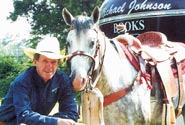 |
|||||
|
|
|||||
|
|||||
|
|
|||||
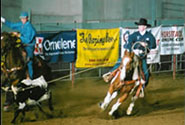 |
|||||
|
Michael heading for the great Sonny Gould |
|||||
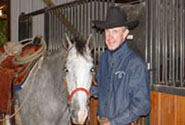 |
|||||
|
Michael & Blue |
 |
|
Please stop |
|
|
|
Send Michael |
Michael Johnson Books
michaelspeaks@msn.com
1172 CR 4122 Campbell, Texas 75422 (903) 862-2082

webmaster
pswope@candw-webmasters.com

